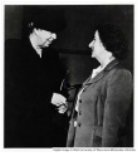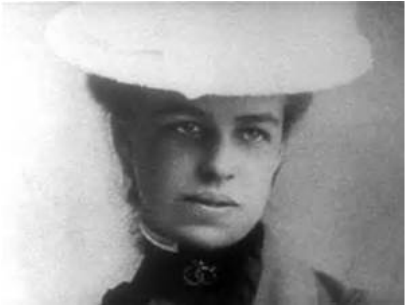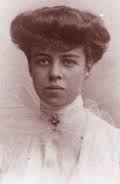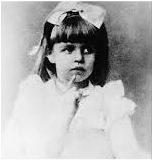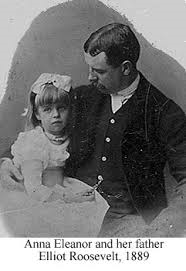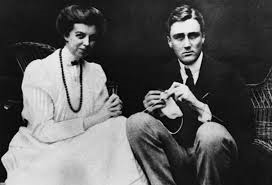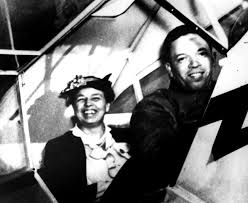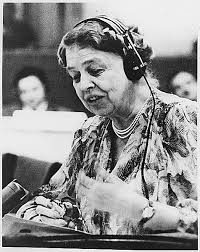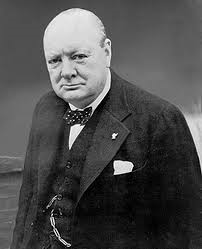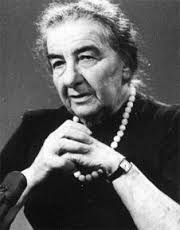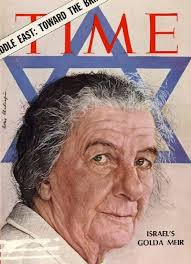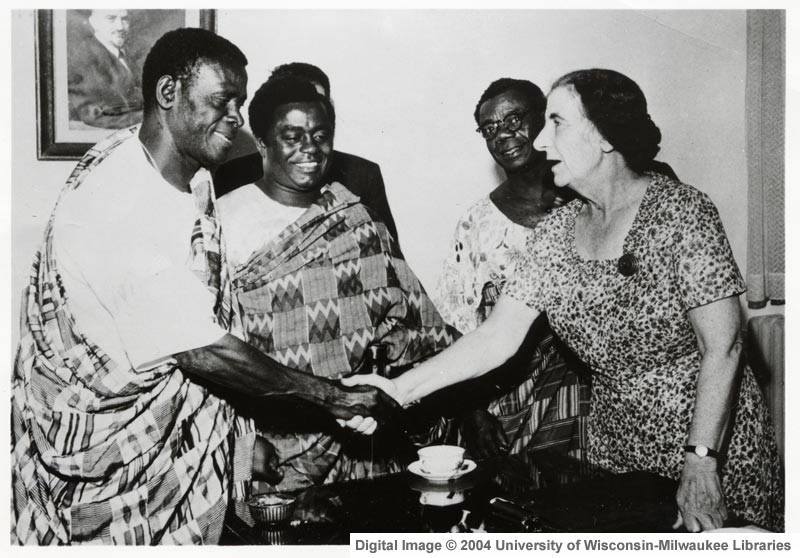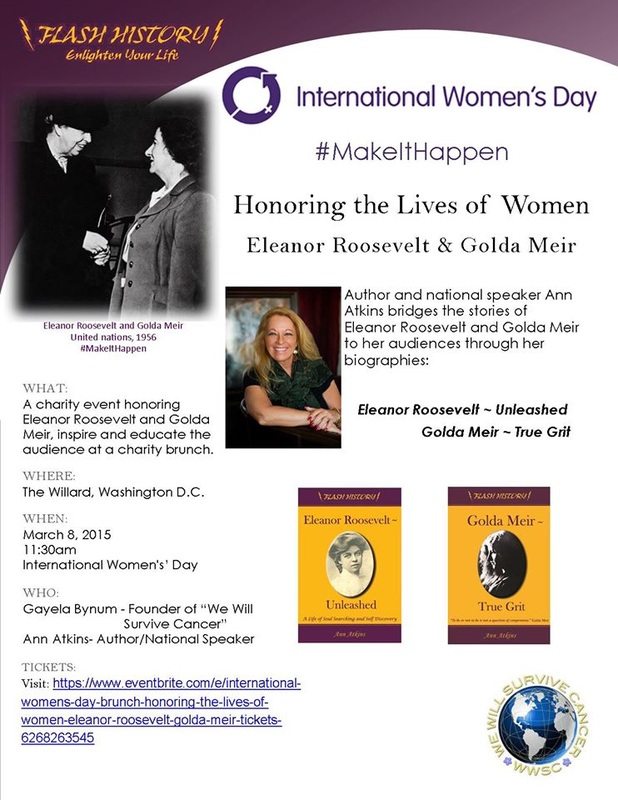Throughout history there are always individuals who usher in major changes in our societies. This is a story about two...Eleanor Roosevelt and Golda Meir.
Eleanor Roosevelt and Golda Meir,
Champions of Change
By Rodney Wayne Branche
Copa: Ann, where are you from?
Ann: I am originally from Savona, New York. It's in the Finger Lakes area and very beautiful.
Ann: I am originally from Savona, New York. It's in the Finger Lakes area and very beautiful.
Copa: Where did you attend school?
Ann: I attended the University of Maryland, received my degree in Psychology and finished my Masters degree in Counseling at Boston University. Both degrees were through their overseas programs while I was living in Germany and England. I also attended classes at the University of Cambridge. That was an extraordinary experience for me.
Ann: I attended the University of Maryland, received my degree in Psychology and finished my Masters degree in Counseling at Boston University. Both degrees were through their overseas programs while I was living in Germany and England. I also attended classes at the University of Cambridge. That was an extraordinary experience for me.
Copa: When did the writing bug first bite you? When did you discover your love for writing?
Ann: When I was a little kid I would sit in this small room in my house that we called the play room. There was an old typewriter, on an equally old school desk. I would sit there and type pretending that I was a writer. I grew up in a family who wanted to conform to society rather than confront. So I really didn't release any critical thinking skill until much later in life. During my 40's I began working on the biography of Eleanor Roosevelt.
Ann: When I was a little kid I would sit in this small room in my house that we called the play room. There was an old typewriter, on an equally old school desk. I would sit there and type pretending that I was a writer. I grew up in a family who wanted to conform to society rather than confront. So I really didn't release any critical thinking skill until much later in life. During my 40's I began working on the biography of Eleanor Roosevelt.
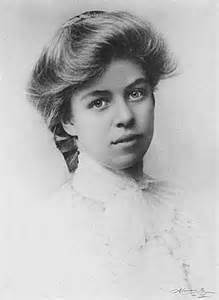
Copa: Before we get to Eleanor, why biographies?
Ann: When I worked as a counselor I used the stories of historical people and what they had to overcome as examples for my clients. This was encouraging and inspiring for them to know they too could overcome struggles in their own life journey. Many people wanted to read more on their own but to get more information you would have to sift through all of these 800 page biographies. Non academics are not interested in all of those details. They want the 'heartbeat' in history. So I created “Flash History.” It’s a biography series that keeps history relevant to the reader’s life. I see life as a journey and history can be your map.
Ann: When I worked as a counselor I used the stories of historical people and what they had to overcome as examples for my clients. This was encouraging and inspiring for them to know they too could overcome struggles in their own life journey. Many people wanted to read more on their own but to get more information you would have to sift through all of these 800 page biographies. Non academics are not interested in all of those details. They want the 'heartbeat' in history. So I created “Flash History.” It’s a biography series that keeps history relevant to the reader’s life. I see life as a journey and history can be your map.
|
Copa: So Eleanor was your first biography. Why her?
Ann: Eleanor was one of people that I used as an example for my clients. There are so many trials that Eleanor overcame in her childhood, drunks and drama queens for a start. Society wanted her to conform to their image but she learned to stay true to her own self. In the midst of betrayal, and adversity she became a person who championed for justice. The themes of betrayal and adversity apply to any generation. So now you see why I focused on her. I wanted to highlight the steps in her journey, her strength and courage is still inspiring us today. |
Copa: Can you give our readers more details of Eleanor's early life?
Ann: This is a family comparable to "Downton Abbey." So that gives you a good idea of their social status. Eleanor was a homely child and her mother, who was drop dead gorgeous, nicknamed Eleanor - 'granny.' People today understand that this sort of thing is damaging to a child's self esteem. Eleanor's mother thought nothing of it.
Eleanor’s father was Elliot Roosevelt, Theodore Roosevelt’s brother. Elliot spent most of his life trying to find himself. He got involved with drugs, alcohol and fast women. Now that's one thing when you are single but another once you are married. So that created more problems. There are many stories of Eleanor trying to get close to her father only to be disappointed. Everyone who has grown up with alcoholics in their family should be nodding their head right now. Eleanor overcame all of that and so much more.
When she married Franklin, the woman’s role was to support/appease their husband. The first eleven years of their marriage, Eleanor had six children. She really tried to be ‘the good wife’ but that didn’t work. Franklin was a womanizer and betrayed Eleanor’s trust. After that she struggled with depression, anorexia and being suicidal. She didn't overcome this overnight. This chapter of her life took a few years to transform and redefine herself. So here again, these struggles are classic to any generation and they apply to men or women.
Ann: This is a family comparable to "Downton Abbey." So that gives you a good idea of their social status. Eleanor was a homely child and her mother, who was drop dead gorgeous, nicknamed Eleanor - 'granny.' People today understand that this sort of thing is damaging to a child's self esteem. Eleanor's mother thought nothing of it.
Eleanor’s father was Elliot Roosevelt, Theodore Roosevelt’s brother. Elliot spent most of his life trying to find himself. He got involved with drugs, alcohol and fast women. Now that's one thing when you are single but another once you are married. So that created more problems. There are many stories of Eleanor trying to get close to her father only to be disappointed. Everyone who has grown up with alcoholics in their family should be nodding their head right now. Eleanor overcame all of that and so much more.
When she married Franklin, the woman’s role was to support/appease their husband. The first eleven years of their marriage, Eleanor had six children. She really tried to be ‘the good wife’ but that didn’t work. Franklin was a womanizer and betrayed Eleanor’s trust. After that she struggled with depression, anorexia and being suicidal. She didn't overcome this overnight. This chapter of her life took a few years to transform and redefine herself. So here again, these struggles are classic to any generation and they apply to men or women.
Copa: With Franklin's health failing during World War II, how did their roles change?
Ann: By now they both had very parallel lives. Eleanor used her position as First Lady to constantly be a voice for women, Blacks, Jews … just to name a few. Much like today, ‘showing up’ sends a message. So for the Tuskegee Airmen, she went down to visit them. She knew this would get a lot of publicity. Not only did she have her photos taken in front of an airplane, she insisted to get into the plane with a black pilot and have him take her up in the aircraft. You could almost hear the senior officers of the airbase gasp! Eleanor’s visit was a great affirmation for the black aviators that they could to the job fighting in the war.
Ann: By now they both had very parallel lives. Eleanor used her position as First Lady to constantly be a voice for women, Blacks, Jews … just to name a few. Much like today, ‘showing up’ sends a message. So for the Tuskegee Airmen, she went down to visit them. She knew this would get a lot of publicity. Not only did she have her photos taken in front of an airplane, she insisted to get into the plane with a black pilot and have him take her up in the aircraft. You could almost hear the senior officers of the airbase gasp! Eleanor’s visit was a great affirmation for the black aviators that they could to the job fighting in the war.
Copa: I often wondered if this was some sort of combined strategy between Eleanor and Franklin on social issues?
Ann: That's such a great question. I think it was a strategy on the part of Franklin because Franklin loved power, this man ran for President four times. To keep this power you must have votes. He never did anything for the black community in the South because he didn’t want to jeopardize the votes of southern whites. So to ensure the black vote he just sent his wife who he knew really wanted to see change. Eleanor wanted to use her position to make a difference. Eleanor wanted to place the topic of social injustices on every kitchen table in America and she was willing to take the heat for it.
Ann: That's such a great question. I think it was a strategy on the part of Franklin because Franklin loved power, this man ran for President four times. To keep this power you must have votes. He never did anything for the black community in the South because he didn’t want to jeopardize the votes of southern whites. So to ensure the black vote he just sent his wife who he knew really wanted to see change. Eleanor wanted to use her position to make a difference. Eleanor wanted to place the topic of social injustices on every kitchen table in America and she was willing to take the heat for it.
Copa: In your opinion, would you say that Eleanor Roosevelt was the first 'progressive' First Lady?
Ann: Yes, definitely so! Yes!!!
Ann: Yes, definitely so! Yes!!!
Copa: Now let's move ahead a bit after the war. What was Eleanor's next agenda?
Ann: Her goal after the war was to be instrumental by using her name and power to work on a better plan for peace for our world. She had witnessed the horrors of WW1 and WW2. Truman appointed Eleanor to be in the first delegation to the United Nations. Eleanor saw this as a means to pragmatically put into place some policy that would help people around the world. The result of her vision is the Universal Declaration of Human Rights. It’s the most translated document in the world.
Eleanor considers The Universal Declaration of Human Rights her greatest accomplishment. People such as Malala Yousafzai, who have the ‘right’ to an education, have Eleanor to thank.
Ann: Her goal after the war was to be instrumental by using her name and power to work on a better plan for peace for our world. She had witnessed the horrors of WW1 and WW2. Truman appointed Eleanor to be in the first delegation to the United Nations. Eleanor saw this as a means to pragmatically put into place some policy that would help people around the world. The result of her vision is the Universal Declaration of Human Rights. It’s the most translated document in the world.
Eleanor considers The Universal Declaration of Human Rights her greatest accomplishment. People such as Malala Yousafzai, who have the ‘right’ to an education, have Eleanor to thank.
Copa: Let's get into further issues of the Post War Era.
Ann: Eleanor also understood that the Jews needed there own country. At this time many countries in the Middle East were drawing all of these lines it was a good time to focus on Israel.
Ann: Eleanor also understood that the Jews needed there own country. At this time many countries in the Middle East were drawing all of these lines it was a good time to focus on Israel.
Copa: At that time the British controlled Israel, would you like to shed a little light on that for us?
Ann: Well, Eleanor and Winston Churchill had a few differences with this issue, she would stand up to him, she did not believe in his colonial perspective, at all. Eleanor felt that they had a right to govern themselves.
Ann: Well, Eleanor and Winston Churchill had a few differences with this issue, she would stand up to him, she did not believe in his colonial perspective, at all. Eleanor felt that they had a right to govern themselves.
Copa: The British and Israel during post WW2, let's talk about it.
Ann: Back during WW1 it was all about the Ottoman Empire and trade routes. America was only interested in the trade routes as well, it's really all about the money, I don't care what time you look at...it's always the same. After the war is when the lines are drawn and decisions are made on who gets what and how much. So the Ottoman Empire breaks up, that's when the British and French start to draw all of these lines and decides on who governs what. Now of course there is the subject of oil, now that really throws a wrench in the works for everyone! So the British put out this thing called the Belfour Agreement in 1948. It's a touchy situation, the wealthy Muslims want to keep the poorer Muslims under control, no body wants the big change when all of these Jews are coming in to upset the balance. Also let's not forget the Americans who wish to continue to keep a good relationship with the Arabs for good negotiations for oil. Now you can see this merry-go-round.
Ann: Back during WW1 it was all about the Ottoman Empire and trade routes. America was only interested in the trade routes as well, it's really all about the money, I don't care what time you look at...it's always the same. After the war is when the lines are drawn and decisions are made on who gets what and how much. So the Ottoman Empire breaks up, that's when the British and French start to draw all of these lines and decides on who governs what. Now of course there is the subject of oil, now that really throws a wrench in the works for everyone! So the British put out this thing called the Belfour Agreement in 1948. It's a touchy situation, the wealthy Muslims want to keep the poorer Muslims under control, no body wants the big change when all of these Jews are coming in to upset the balance. Also let's not forget the Americans who wish to continue to keep a good relationship with the Arabs for good negotiations for oil. Now you can see this merry-go-round.
Golda Meir
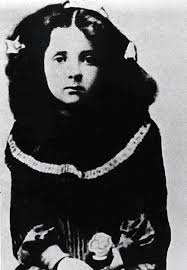
Copa: Your next biography is Golda Meir ~ True Grit. Please tell us about the early years of the life of Golda.
Ann: Golda, was a child prodigy in principles. Her family were Russian Jews who immigrated to Milwaukee in the early 1900s. In Russia, Jews didn’t have civil rights and there was the constant threat of mass gangs murdering Jews and destroying their homes. These episodes of violence were called pogroms. It was much like the KKK coming in and laying waste to the black side of the village and the local authorities aren't really interested in doing anything about it.
Even as a young girl, Golda never tolerates injustice. For instance there was one day in school when she realized that all of the children in her school could not afford to have their own books. Golda establishes the 'Young American Sisters Society.' She is only 11 years old and she raises the necessary funds to get every student their books. Nobody else thought to do this but Golda did. One time this little girl came to Golda and told her that a boy threw a penny down in front of her and told her to pick it up. So she did. Then the boy told her that a dirty Jew would always pick up a penny! So Golda organizes a group of kids to go to that boy's house to protest what he did to the little girl. So Golda never tolerated injustices at any level and that's just the way she was. This is what led her to the next stage of her destiny.
Golda and her husband and some friends moved to Palestine in the 1920's to be a part of Israel becoming a nation. It's not for another 25 years, 1948, that Israel becomes independent. The British always wanted to appease the Arabs because of oil. Throughout World War II the Arabs sided with the Germans but since Americans and British were so interested in oil the western countries were willing to overlook this fact.
Ann: Golda, was a child prodigy in principles. Her family were Russian Jews who immigrated to Milwaukee in the early 1900s. In Russia, Jews didn’t have civil rights and there was the constant threat of mass gangs murdering Jews and destroying their homes. These episodes of violence were called pogroms. It was much like the KKK coming in and laying waste to the black side of the village and the local authorities aren't really interested in doing anything about it.
Even as a young girl, Golda never tolerates injustice. For instance there was one day in school when she realized that all of the children in her school could not afford to have their own books. Golda establishes the 'Young American Sisters Society.' She is only 11 years old and she raises the necessary funds to get every student their books. Nobody else thought to do this but Golda did. One time this little girl came to Golda and told her that a boy threw a penny down in front of her and told her to pick it up. So she did. Then the boy told her that a dirty Jew would always pick up a penny! So Golda organizes a group of kids to go to that boy's house to protest what he did to the little girl. So Golda never tolerated injustices at any level and that's just the way she was. This is what led her to the next stage of her destiny.
Golda and her husband and some friends moved to Palestine in the 1920's to be a part of Israel becoming a nation. It's not for another 25 years, 1948, that Israel becomes independent. The British always wanted to appease the Arabs because of oil. Throughout World War II the Arabs sided with the Germans but since Americans and British were so interested in oil the western countries were willing to overlook this fact.
Copa: Tell us more about Golda and her relations with the British.
Ann: Golda was the one who was chosen to make a plea for the Jewish immigrants to receive the necessary documents to gain entry into Palestine without interference, this was at the end of the war and people were still living in deportation camps. Golda told the British that if you just let them in, the Jews would take care of each other. This is where the movie "Exodus" comes in to explain that point. Even after the Holocaust the British were loath to help the Jews because the British policy was to still appease the Arabs.
Ann: Golda was the one who was chosen to make a plea for the Jewish immigrants to receive the necessary documents to gain entry into Palestine without interference, this was at the end of the war and people were still living in deportation camps. Golda told the British that if you just let them in, the Jews would take care of each other. This is where the movie "Exodus" comes in to explain that point. Even after the Holocaust the British were loath to help the Jews because the British policy was to still appease the Arabs.
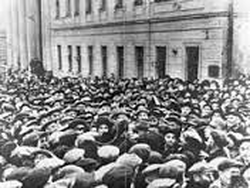
Copa: Okay Israel wins its independence, what situation does Golda find herself in?
Ann: One of Golda's first jobs was to be the Ambassador to Russia, she's kind of annoyed about this because her country just won their independence. Israel is immediately attacked so the last thing Golda wanted to do was go to Russia. She wasn't sure there would be a country to come back to. While she was in Russia, Golda attended a Yom Kippur service. When she came out there were thousands of Jews circled around her, they were overjoyed in her visit there as an Ambassador. There is a famous picture of her there in Moscow that was very popular. Years later, many people would stop Golda to say they remembered her visit and had the photograph.
When Gold was Foreign Minister to Africa, something like our Secretary of State, she viewed the situation of these countries like her own. They were once under colonial rule and wished to flourish under their new independence. Israel sent thousands of doctors, teachers and administrators to help these countries establish some infrastructure. And Golda still doesn’t tolerate injustice. When she and other dignitaries go on a trip to see Victoria Falls, they take a bus to the location. When they get there, the guides say all of the whites over in this section and all of the black in another section. Immediately Golda tells the guides, "That's fine, I don't need to see the falls!"
This is what Golda has in common with Eleanor, the ability to take their position of power and challenge society to make a change. They don’t just make rhetorical speeches.
Ann: One of Golda's first jobs was to be the Ambassador to Russia, she's kind of annoyed about this because her country just won their independence. Israel is immediately attacked so the last thing Golda wanted to do was go to Russia. She wasn't sure there would be a country to come back to. While she was in Russia, Golda attended a Yom Kippur service. When she came out there were thousands of Jews circled around her, they were overjoyed in her visit there as an Ambassador. There is a famous picture of her there in Moscow that was very popular. Years later, many people would stop Golda to say they remembered her visit and had the photograph.
When Gold was Foreign Minister to Africa, something like our Secretary of State, she viewed the situation of these countries like her own. They were once under colonial rule and wished to flourish under their new independence. Israel sent thousands of doctors, teachers and administrators to help these countries establish some infrastructure. And Golda still doesn’t tolerate injustice. When she and other dignitaries go on a trip to see Victoria Falls, they take a bus to the location. When they get there, the guides say all of the whites over in this section and all of the black in another section. Immediately Golda tells the guides, "That's fine, I don't need to see the falls!"
This is what Golda has in common with Eleanor, the ability to take their position of power and challenge society to make a change. They don’t just make rhetorical speeches.
Copa: It seems there are lots more amazing stories for our readers in your books. Tell me what is your next biography?
Ann: My next book is Marie Curie ~ A Nobel Life. Aside from being brilliant and receiving two Nobel Prizes in two different categories, Marie never patented her discoveries. She knew radium would be used to treat cancer and didn’t want patents to get in the way of advancing medical research.
Ann: My next book is Marie Curie ~ A Nobel Life. Aside from being brilliant and receiving two Nobel Prizes in two different categories, Marie never patented her discoveries. She knew radium would be used to treat cancer and didn’t want patents to get in the way of advancing medical research.
Copa: Thank you for having Copa help tell the story of these incredible women.
Link to FOX Channel 5 Interview
~Copa

